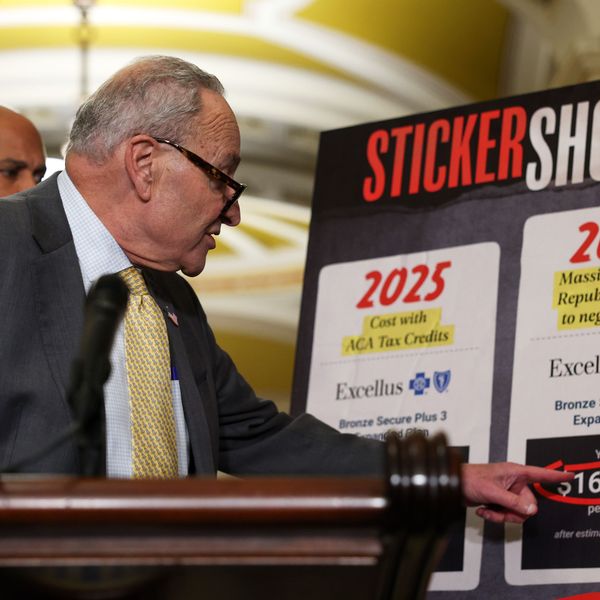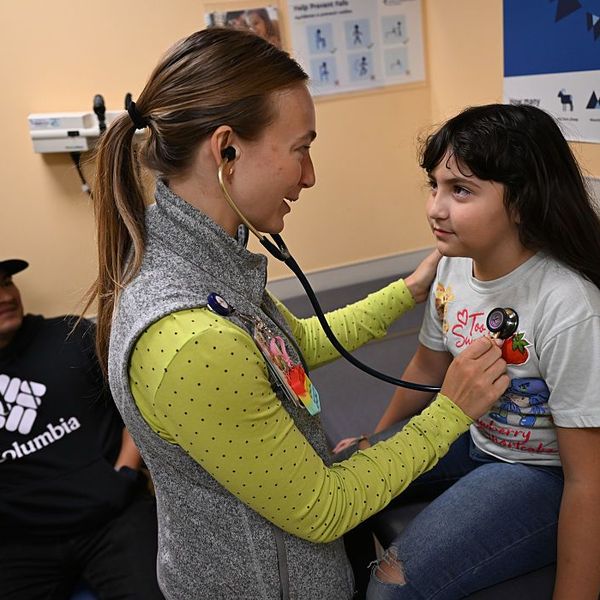
Donald Savastano, seen on the left, on Jan. 3 when he was presented with a ceremonial million dollar check at the convenience store in upstate New York where he bought the winning lottery ticket. (Photo: screengrab from WBNG video)
Lottery Winner, Finally Able to Afford Healthcare, Learns He Has Cancer and Dies Within Weeks of Getting $1 Million
Donald Savastano had reportedly "been scrounging up every penny he had for the doctor's visit"
In a tragedy that captures the broken U.S. healthcare system, a New York state man died of cancer weeks after a $1 million lottery win allowed the uninsured man to finally visit the doctor.
The stage 4 cancer diagnosis he was given, Donald Savastano's mother said, "was just too late."
Fifty-one-year old Savastano bought the ticket Dec. 30 at a convenience store in Masonville. On Jan. 8, days after getting a ceremonial check, he received the lump sum of $661,800. He died January 26.
"This is going change our lives, to tell you the truth," he said after claiming the prize.
"Being a self-employed carpenter, I didn't really have a plan for retirement," he said to the New York Lottery. "The money will help with that. I don't have any other extravagant plans. I'll buy a new truck, pay off some debt, and invest for the future."
The new money would also let him afford a trip to the doctor. The New York Post reports that Savastano "had been scrounging up every penny he had for the doctor's visit, and was looking forward to finally getting an answer about the pain he was having, according to his mom, Annette Savastano."
Danielle Scott, the cashier who sold Savastano the ticket, said to WBNG, "He was self employed, he didn't have insurance, he hadn't been feeling good for a while I guess, and when he got the money he went into the doctor."
"He had a friend come and talk to me, and they told me that he was very sick and that he had brain and lung cancer and that he was in the hospital and they didn't think he was gonna make it," she said.
He was given just a few weeks to live.
According to his obituary, Savastano "was known for his high-quality work and perfectionism. He always tried to reach out and help those he could by teaching them 'the right way to do things.'"
Millions in the U.S., like Savastano, face economic barriers to accessing healthcare.
A Gallup poll released this month revealed that 12.2 percent of Americans have no health insurance. The figure marked a 1.3 percentage point increase (an increase of 3.2 million people) from 2016.
The situation is projected to worsen under the Trump administration, as ThinkProgress reported: "The Republican tax bill repealed the individual mandate, and the Congressional Budget Office projects 4 million more people will be without insurance in 2019, and 13 million in 2027."
In a statement issued last month, Worlth Health Organization head Tedros Adhanom Ghebreyesus called universal health coverage a "solution" that "allows everyone to obtain the health services they need, when and where they need them, without facing financial hardship."
An Urgent Message From Our Co-Founder
Dear Common Dreams reader, The U.S. is on a fast track to authoritarianism like nothing I've ever seen. Meanwhile, corporate news outlets are utterly capitulating to Trump, twisting their coverage to avoid drawing his ire while lining up to stuff cash in his pockets. That's why I believe that Common Dreams is doing the best and most consequential reporting that we've ever done. Our small but mighty team is a progressive reporting powerhouse, covering the news every day that the corporate media never will. Our mission has always been simple: To inform. To inspire. And to ignite change for the common good. Now here's the key piece that I want all our readers to understand: None of this would be possible without your financial support. That's not just some fundraising cliche. It's the absolute and literal truth. We don't accept corporate advertising and never will. We don't have a paywall because we don't think people should be blocked from critical news based on their ability to pay. Everything we do is funded by the donations of readers like you. Will you donate now to help power the nonprofit, independent reporting of Common Dreams? Thank you for being a vital member of our community. Together, we can keep independent journalism alive when it’s needed most. - Craig Brown, Co-founder |
In a tragedy that captures the broken U.S. healthcare system, a New York state man died of cancer weeks after a $1 million lottery win allowed the uninsured man to finally visit the doctor.
The stage 4 cancer diagnosis he was given, Donald Savastano's mother said, "was just too late."
Fifty-one-year old Savastano bought the ticket Dec. 30 at a convenience store in Masonville. On Jan. 8, days after getting a ceremonial check, he received the lump sum of $661,800. He died January 26.
"This is going change our lives, to tell you the truth," he said after claiming the prize.
"Being a self-employed carpenter, I didn't really have a plan for retirement," he said to the New York Lottery. "The money will help with that. I don't have any other extravagant plans. I'll buy a new truck, pay off some debt, and invest for the future."
The new money would also let him afford a trip to the doctor. The New York Post reports that Savastano "had been scrounging up every penny he had for the doctor's visit, and was looking forward to finally getting an answer about the pain he was having, according to his mom, Annette Savastano."
Danielle Scott, the cashier who sold Savastano the ticket, said to WBNG, "He was self employed, he didn't have insurance, he hadn't been feeling good for a while I guess, and when he got the money he went into the doctor."
"He had a friend come and talk to me, and they told me that he was very sick and that he had brain and lung cancer and that he was in the hospital and they didn't think he was gonna make it," she said.
He was given just a few weeks to live.
According to his obituary, Savastano "was known for his high-quality work and perfectionism. He always tried to reach out and help those he could by teaching them 'the right way to do things.'"
Millions in the U.S., like Savastano, face economic barriers to accessing healthcare.
A Gallup poll released this month revealed that 12.2 percent of Americans have no health insurance. The figure marked a 1.3 percentage point increase (an increase of 3.2 million people) from 2016.
The situation is projected to worsen under the Trump administration, as ThinkProgress reported: "The Republican tax bill repealed the individual mandate, and the Congressional Budget Office projects 4 million more people will be without insurance in 2019, and 13 million in 2027."
In a statement issued last month, Worlth Health Organization head Tedros Adhanom Ghebreyesus called universal health coverage a "solution" that "allows everyone to obtain the health services they need, when and where they need them, without facing financial hardship."
In a tragedy that captures the broken U.S. healthcare system, a New York state man died of cancer weeks after a $1 million lottery win allowed the uninsured man to finally visit the doctor.
The stage 4 cancer diagnosis he was given, Donald Savastano's mother said, "was just too late."
Fifty-one-year old Savastano bought the ticket Dec. 30 at a convenience store in Masonville. On Jan. 8, days after getting a ceremonial check, he received the lump sum of $661,800. He died January 26.
"This is going change our lives, to tell you the truth," he said after claiming the prize.
"Being a self-employed carpenter, I didn't really have a plan for retirement," he said to the New York Lottery. "The money will help with that. I don't have any other extravagant plans. I'll buy a new truck, pay off some debt, and invest for the future."
The new money would also let him afford a trip to the doctor. The New York Post reports that Savastano "had been scrounging up every penny he had for the doctor's visit, and was looking forward to finally getting an answer about the pain he was having, according to his mom, Annette Savastano."
Danielle Scott, the cashier who sold Savastano the ticket, said to WBNG, "He was self employed, he didn't have insurance, he hadn't been feeling good for a while I guess, and when he got the money he went into the doctor."
"He had a friend come and talk to me, and they told me that he was very sick and that he had brain and lung cancer and that he was in the hospital and they didn't think he was gonna make it," she said.
He was given just a few weeks to live.
According to his obituary, Savastano "was known for his high-quality work and perfectionism. He always tried to reach out and help those he could by teaching them 'the right way to do things.'"
Millions in the U.S., like Savastano, face economic barriers to accessing healthcare.
A Gallup poll released this month revealed that 12.2 percent of Americans have no health insurance. The figure marked a 1.3 percentage point increase (an increase of 3.2 million people) from 2016.
The situation is projected to worsen under the Trump administration, as ThinkProgress reported: "The Republican tax bill repealed the individual mandate, and the Congressional Budget Office projects 4 million more people will be without insurance in 2019, and 13 million in 2027."
In a statement issued last month, Worlth Health Organization head Tedros Adhanom Ghebreyesus called universal health coverage a "solution" that "allows everyone to obtain the health services they need, when and where they need them, without facing financial hardship."

